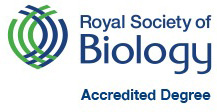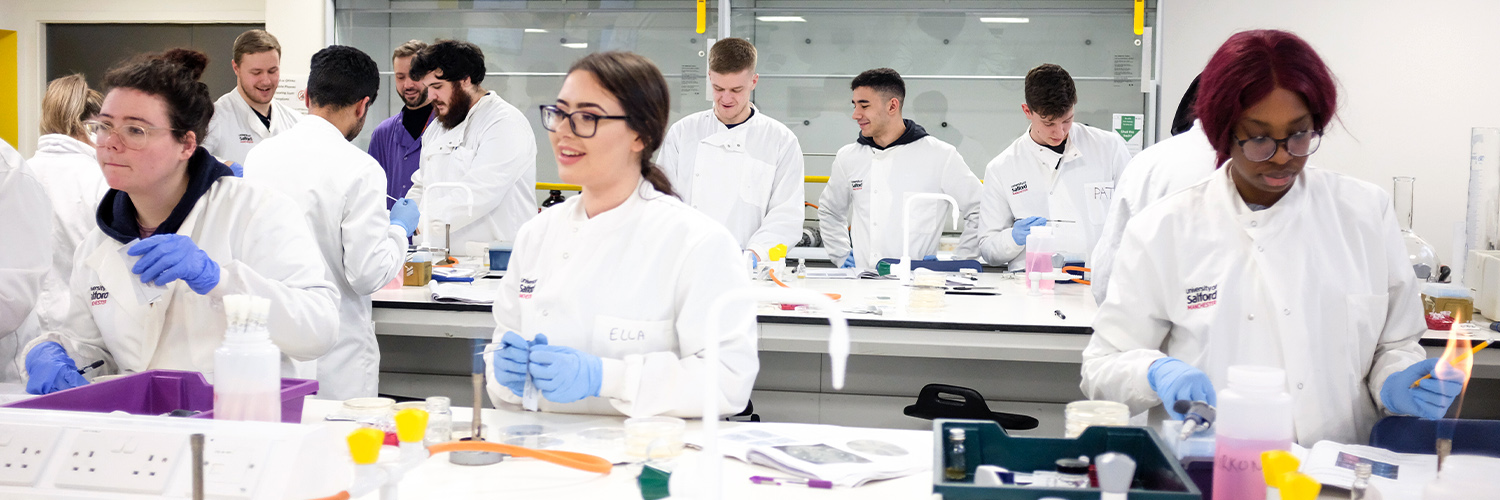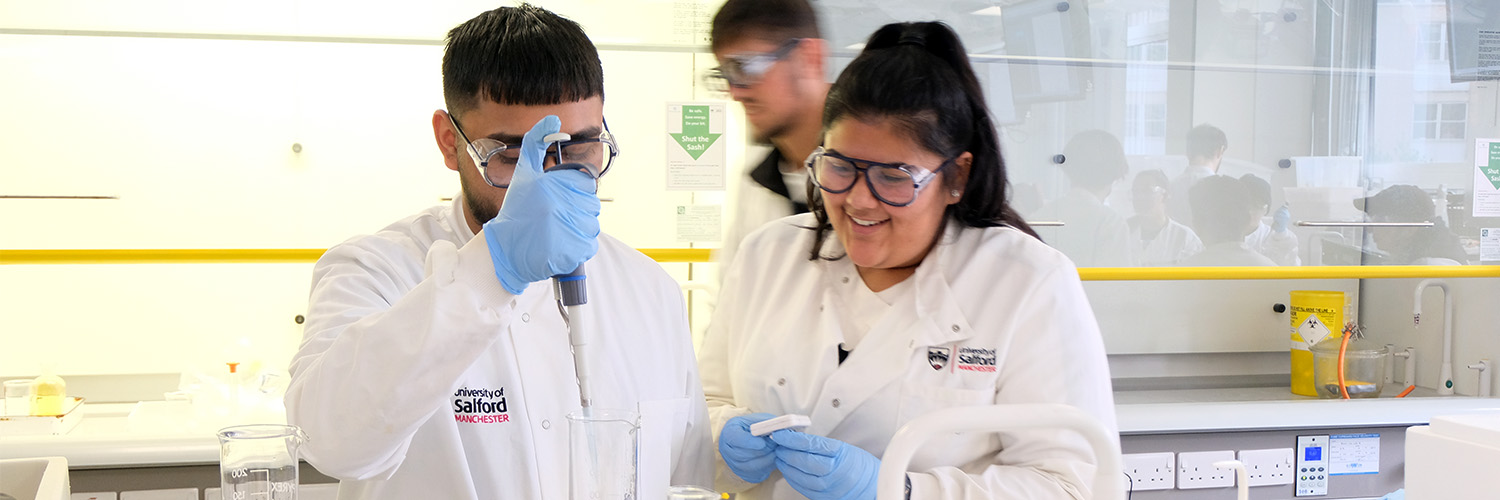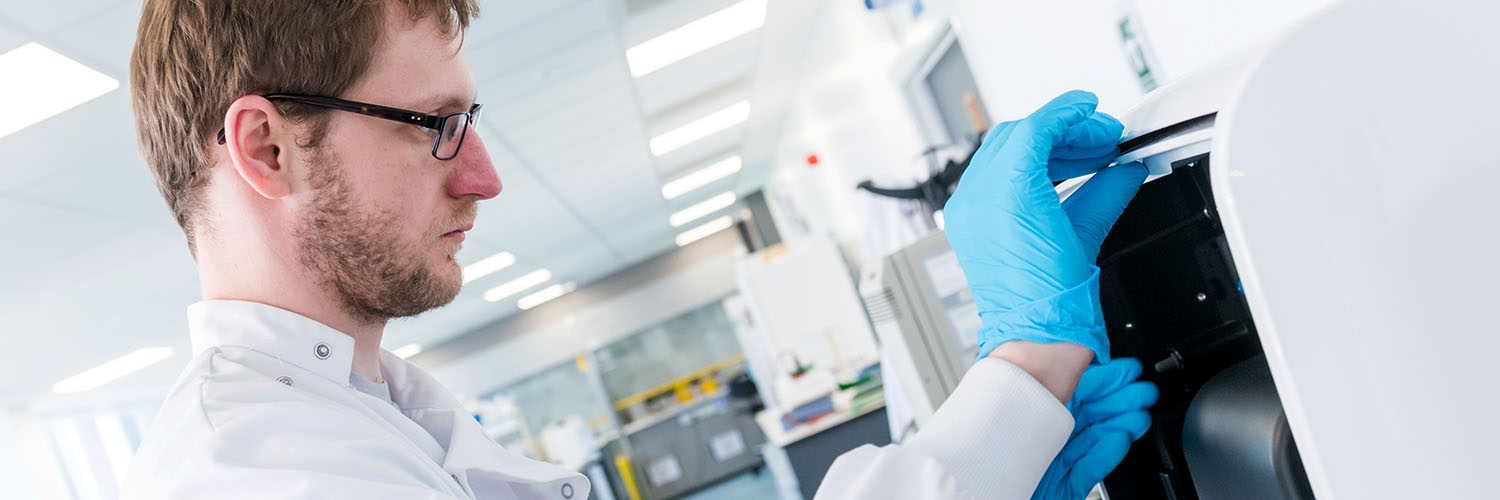Biochemistry
Full-time
With placement
Part-time
Three year
Four year
Six year
September 2025
In a nutshell
Biochemistry has become the foundation for understanding all biological processes. It is at the cutting-edge of research and is an exceptionally versatile scientific discipline with opportunities in the field continuing to grow. The knowledge and methods developed by biochemists are applied to all fields of medicine and agriculture as well as many chemical and health related industries.
We pride ourselves on our research and have recently invested extensively in our facilities to ensure that you are able to complete research projects that are exciting and inspiring, contributing useful findings to the field. Examples of biochemistry research areas that you can explore include nanotechnology, drug design and repurposing, cancer and antimicrobial research, natural products, biomarkers, analytical detection of volatiles, mass spectrometry, computational studies, skin modelling, lung diseases, biotechnology, toxicology and much more.
This degree is accredited by the Royal Society of Biology. If you choose to do a placement year after the second year of the degree then your degree will have 'Advanced Degree Accreditation' by the Royal Society of Biology.
Start your study journey
Register for our next Open Day to learn more about studying biochemistry, explore our facilities and meet the course team
You will:
- Explore areas of research such as nanotechnology, drug design and repurposing, cancer and antimicrobial, lung diseases, biotechnology, toxicology and much more
- Have the opportunity to do a placement year after your second year
- Gain the skills needed to take advantage of career opportunities in an expanding field
options available
students accepted
Course accreditations

This is for you if...
You have a strong interest in both the chemical and biological sciences
You want to operate in a cutting-edge research field
You would like experience in industry through a placement year
All about the course
Course delivery
BSc Biochemistry is delivered full-time over three years (or four if you choose to include an industry placement) via a programme of practice-focused modules. You'll explore important scientific subjects including biological chemistry, organic chemistry, and genetics, while developing your practical skills in our Bodmer laboratories.
Throughout your studies, you will also choose from a selection of specialised biochemistry modules and complete your studies with a supervised research project in a subject of your choice.
Learn more about the course modules in the section below.
Learning experience
With a focus on practical learning, throughout the biochemistry degree you will learn cutting-edge scientific knowledge and techniques. You will develop your knowledge of how organisms work at the molecular level in the fields of medicine, agriculture, and in many chemical and health-related industries.
For example, in the second year of your degree you’ll take a module focusing on Genomics and learn how you can study genes to accurately predict, diagnose and treat diseases more precisely than ever.
Industry placement
On this biochemistry course, you will have the option to take an industry placement year between years two and three. Although you'll be responsible for securing your placement, a tutor will support you, monitor your progress and assess your final placement report. If you successfully complete a placement year as part of your studies, your degree will attain 'Advanced Degree Accreditation' by the Royal Society of Biology.
Recent biochemistry students have undertaken placements at the Respiratory Physiology Unit at the Royal Aintree Hospital in Liverpool, AstraZeneca in Cheshire, the Cancer Research UK Manchester institute and the Hochschule in Bremen, North Germany.
Biological Chemistry
This module will help you understand key concepts in biological chemistry, including spectroscopy and spectrometry techniques for identifying small organic molecules; chemical reactivity and molecular interactions; chromatography; and kinetics and thermodynamics.
Genetics
Genetics has become a central topic not only in biological science, but also for topics such as data science, art and culture. Genetics is revolutionising all spheres of life at an unprecedented speed. It is central to all areas of biology, from cellular development and reproduction to conservation and biodiversity. In this core module, we will provide you with the framework of this diverse area, covering areas from DNA fingerprinting and DNA/RNA editing, to ethics and conservation biology. We will expose you to the latest research in the area of molecular genetics and provide the foundation for your future.
Biochemical and Pharmaceutical Skills
This is a practical laboratory based module aiming to develop practical skills in the areas of biochemistry, pharmaceutical sciences and general chemistry. The students will be involved in hands-on laboratory work covering a range of essential techniques used in academia and industry. Students will be given feedback on their work during the classes.
Introduction to Organic Chemistry
The aim of this module is to introduce organic chemistry through structure and mechanism. You will study organic reactions of key functional groups such as alkenes, carbonyl and aromatic compounds.
Introductory Biochemistry
The aim of this module is to introduce principles of biochemistry. You will study biochemical pathways and organelles, relevant to cell biology.
Cell Biology
This module provides a broad cell biology knowledge base, building a solid foundation of key scientific content relevant to subsequent modules within several bioscience degrees.
Clinical and Molecular Genetics
Clinical and Molecular Genetics will enable students to gain practical skills in molecular biology and bioinformatics, through linked laboratory and computer sessions. The lecture programme is delivered by three academics, each an expert in their specific area of clinical and molecular genetics. Topics covered include, current molecular biology and bioinformatics techniques, the control of bacterial and eukaryotic gene expression and the effect of mutations on gene expression and how this can lead to human genetic diseases.
Fundamentals of Biochemistry
This module comprises a series of laboratory practicals and lectures that focus on teaching core skills in protein biochemistry and key aspects of metabolism.
Chemical and Biochemical Research Skills
This module will help you develop your scientific writing and communication skills, and understand key statistical methods that may be applied to the chemical and biochemical sciences.
Human Physiology
Physiology is the science of life. During the Human Systems Physiology module, you will explore the function of each major organ system. You will discover the molecular and cellular mechanisms that underlay this function, and how organ systems are integrated and regulated to maintain homeostasis, while allowing the human body to adapt to changing metabolic and environmental demands. Laboratory classes use cutting-edge equipment that allow you to see “physiology in action” and develop competence in the techniques used by physiologists to advance the field.
Genomics and Proteomics
This module provides an appreciation of topics in biochemistry with an emphasis on genomics, proteomics, structural biology and their application in research and industry.
Medical Biochemistry
You will be introduced to the concepts of chemical and biochemical testing and their relevance to clinical diagnostics. The module will develop your knowledge and understanding about biochemical changes in disease, and you will learn practical techniques used in clinical chemistry laboratory. This module is a combination of lectures and practical sessions.
Biochemistry of Drugs and Disease
This module will provide a contemporary overview of some important disease processes and associated drug intervention mechanisms.
New
Current Topics in Biochemistry
This module comprises a series of lectures based around the latest research developments in biochemistry. There is also a lab practical/mini-project on gene function analysis in Caenorhabditis elegans using the technique of RNA-interference (RNAi).
Final Year Project and Professional Skills
This dissertation module allows you to develop independent research skills, including both data collection/generation (for example, via lab-based research or fieldwork) and analysis, while conducting research on a topic in an area relevant to your programme of study. You will also develop your professional skills, with a focus on employability.
Choose one option from the following:
Science and Industry
This module will help you develop an understanding of the fundamentals of sustainability and greenness, and recovery from a post-pandemic landscape featuring skills sets of biochemistry, chemistry, biomedical, pharmaceutical and personal health care, from the laboratory to gaining understanding of the workings of industry. The material issued as lecture notes and support guides will be all released pre-module and each lecture session will flip learning to workshop through the academic staff and invited industry speakers for real world experience.
Cancer: Bench to Bedside
Students will learn the critical biological capabilities that enable tumour cancer initiation, maintenance and progression, and how some of these hold promise as therapeutic targets for cancer treatment. The module contains an overview of the basic biology of cancer and applicable therapeutic strategies, with attention paid to relevant current technologies and future directions in cancer biology. Lectures will be complemented with tutorials where students will be involved in critical reading of scientific papers, while learning to evaluate scientific data and familiarise themselves with a variety of modern techniques.
And choose one option from the following
Biotechnology
This module will help you develop an understanding of molecular techniques underpinning the science associated with the societal grand challenges of feeding the world and antibiotic resistance, and introduce the principles and techniques of genetic modification. On completion you will be able to apply a range of research and presentation techniques to a choice of research projects.
Clinical Immunology
Immunology is the study of the immune system. It is now a well-developed basic science, which is useful for the diagnosis and management of a great number and variety of human diseases. This module is designed to give an in-depth view of the basic components of the immune system and how these influence human diseases. Research-based discussion will be part of this module in understanding immune mechanisms in defense against human diseases and how these mechanisms can be dysregulated. Understanding the immune system leads to better clinical diagnostic and monitoring possibilities. Towards the end of the module you will also be given an overview of how the immune system can protect the body from developing cancers.
Part-time Structure
If you are studying part-time you select two to four modules from each year of study, completing the rest of the modules for the year in the following year. This leads to a maximum six-year duration for a part-time degree. If studying part-time you do not have the placement option.
Please note that it may not be possible to deliver the full list of options every year as this will depend on factors such as how many students choose a particular option. Exact modules may also vary in order to keep content current. When accepting your offer of a place to study on this programme, you should be aware that not all optional modules will be running each year. Your tutor will be able to advise you as to the available options on or before the start of the programme. Whilst the University tries to ensure that you are able to undertake your preferred options, it cannot guarantee this.
Frequently asked questions
What is biochemistry?
As the name implies, biochemistry merges the fields of biology and chemistry. It is dedicated to the study of chemical processes within biological cells.
Is a biochemistry degree hard?
Studying a Biochemistry degree can be challenging yet offers many rewarding benefits. At the University of Salford, you will be at the cutting-edge of research and the projects you will undertake will be exciting and inspiring.
Despite the challenging and busy nature of our biochemistry programme, it can be very rewarding as you’ll be building your knowledge and making an impact in such an important field. By the end of your biochemistry degree, you will have developed many key skills including teamwork, communication, numerical and data analysis and independent thinking.
There are methods to ensure you’re getting the best of your biochemistry degree, including practising good time management and making time for yourself to recharge. If you find your studies overwhelming, there will be support available from your lecturers and university support staff.
What can you do with a biochemistry degree?
Obtaining a biochemistry degree opens many diverse career opportunities in both research and industry, spanning various fields including food and agriculture, health and environmental sciences. Some roles you could pursue after completing your degree include:
- Biomedical scientist
- Clinical research associate
- Academic researcher
- Biotechnologist
- Research scientist
- Scientific laboratory technician
Our biochemistry degree is ideal if you are interested in a career in the biotechnology, pharmaceutical, food or brewing industries, as well as in clinical or other biomedical areas such as forensic science and analytical biochemistry.
Our graduates are employed across bioscience by companies such as AstraZeneca and the Cancer Research UK Manchester Institute, or many carry on to further study. Additionally, biochemists with knowledge of physiology are in demand in sports science, healthcare, hospitals and the pharmaceutical industry, as well as in research establishments and other areas of bioscience.
School of Science, Engineering and Environment
Rising to the challenge of a changing world, our biochemistry degree courses are designed to shape the next generation of urbanists, scientists, engineers, consultants and leaders.
Driven by industry, and delivered by supportive programme teams, you can develop the knowledge and skills to become unstoppable in your career.
Facilities
As a biochemistry student, you will be based in our advanced, integrated teaching laboratory known as the Bodmer Lab. This specialist, purpose-built facility ensures that you benefit from the latest technologies to keep teaching and learning apace with cutting-edge innovation and discovery.
Industry collaboration and research
When you start this biochemistry degree with Salford, you are also joining a community making a difference in industry, our local region and in our wider society.
Many of our academics and technicians who support your course also deliver collaborative, interdisciplinary, high-impact work in a range of bioscience issues and challenges.
Discover how you are part of something bigger.
After your Biochemistry degree
Employment
With training allowing you to develop your own personal skill set in laboratory science, theoretical science and softer skills ready for the working world, this programme will enhance your employability and personal development, allowing you to enter the working world with an enhanced and divergent skill set. Here in the North West there is a burgeoning life sciences and chemical sciences sector, and this biochemistry course is aligned to the demand for skills that this industry is generating.
Biochemistry is at the cutting-edge of research and is an exceptionally versatile scientific discipline with opportunities in the field continuing to grow and develop. The knowledge and methods developed by biochemists are applied to all fields of medicine and agriculture as well as many chemical and health related industries. Biochemistry is also unique in providing teaching and research in both protein structure and function, and genetic engineering - the two basic components of the rapidly expanding field of biotechnology.
This biochemistry course is ideal if you are interested in a career in the biotechnology, pharmaceutical, food or brewing industries, as well as in clinical or other biomedical areas such as forensic science and analytical biochemistry. Our graduates are employed across bioscience by companies such as AstraZeneca and the Cancer Research UK Manchester Institute, or many carry on to further study. Additionally, biochemists with knowledge of physiology are in demand in sports science, in healthcare and hospitals and in the pharmaceutical industry, as well as in research establishments and other areas of bioscience.
Further study
You might find you want to learn more about biochemistry or other sciences. Building on our scientific expertise, we offer a range of postgraduate courses that can take your interests and career opportunities further. Salford graduates and alumni also qualify to receive a generous fees discount.
Biochemistry graduates can also choose to follow a research programme with our Biomedical Research Centre to further their knowledge in topics such as microbiology, parasitology, medicinal chemistry, cancer and cell biology. Learn more about postgraduate research opportunities available through our Doctoral School.
How to get accepted on the Biochemistry course
Applicant profile
We are looking for applicants with a strong interest in both the chemical and biological sciences, and a desire to operate in a cutting-edge research field.
English language requirements
If you are an international student and not from a majority English speaking country, you will need IELTS 6.0 with no element below 5.5. We also accept a range of other English language qualifications. If you do not have the English language requirements, you could take the Pre-Sessional English course, or the International Foundation Year to gain entry onto this degree.
Accreditation
This course is accredited by the Royal Society of Biology, which means that it meets their requirements for receiving up-to-date knowledge in the right learning, support and teaching environment. Studying an accredited course is one way of showing employers you have the knowledge and skills that they are looking for in graduates and has the potential benefits of greater employability prospects and enhanced competitiveness in a crowded global jobs market.
UCAS tariff points
112 points including Biology and Chemistry grade C. A pass in the practical element of Science A levels must be achieved.
A level
112 points including Biology and Chemistry grade C. A pass in the practical element of Science A levels must be achieved.
BTEC National Diploma
DMM in a suitable science subject, which must include biology and chemistry.
BTEC Higher National Diploma
Possible entry to year 3
T Level
If applying to start in September 2024, you will need 120 UCAS points in T Level Science.
Foundation Degree
Possible entry to year 3
Scottish Highers
112 points from Higher Level, including Higher Level Chemistry and Biology
Irish Leaving Certificate
112 points from Higher Level, including Higher Level Chemistry and Biology.
European Baccalaureate
Pass in Diploma of at least 60% including at least one science subject
International Baccalaureate
30 points including grade 4 in Higher Level Biology and Chemistry.
Access to HE
112 UCAS points from QAA-approved Science access course, must include Biology and Chemistry.
GCSE
English and mathematics at grade C or 4 or above.
You must fulfil our GCSE entry requirements as well as one of the requirements listed below.
International Students
We accept qualifications from all around the world. Find your country to see a full list of entry requirements. If you do not meet the entry requirements, you could take the International Foundation Year to gain entry onto this degree.
Salford Alternative Entry Scheme (SAES)
We welcome applications from students who may not meet the stated entry criteria but who can demonstrate their ability to pursue the course successfully. Once we have received your application we will assess it and recommend it for SAES if you are an eligible candidate.
There are two different routes through the Salford Alternative Entry Scheme and applicants will be directed to the one appropriate for their course. Assessment will either be through a review of prior learning or through a formal test.
The cost of studying Biochemistry
| Type of study | Year | Fees |
|---|---|---|
| Full-time home | 2025/26 | £9,250.00per year |
| Full-time international | 2025/26 | £17,650.00per year |
Additional costs
All field trips are funded by the school but you may need to consider additional costs such as food and spending money.
International field trips that are part of core modules are also funded by the school but you will need to pay towards international field trips that are part of optional modules (although these are subsidised by the school) and you will be made aware of these costs before selecting the module.
You should also consider further costs which may include books, stationery, printing, binding and general subsistence on trips and visits.
Scholarships for International Students
If you are a high-achieving international student, you may be eligible for one of our scholarships to study biochemistry. Explore our international scholarships.



